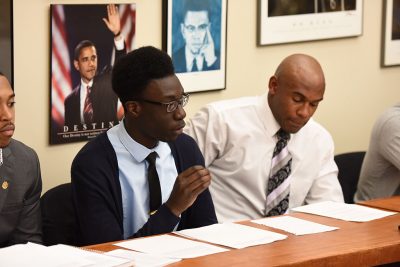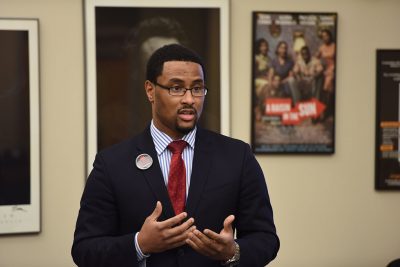In honor of Black History Month, UConn students gathered this past week at the University’s African-American Cultural Center for a panel discussion featuring six panelists from two student groups, Collective Uplift and Brothers Reaching Our Society (B.R.O.S.). Panelists discussed issues facing today’s African-Americans, including how Black males are and can continue to “take control over their own image.” These words, spoken by Joseph Cooper, assistant professor in the Neag School of Education and the founder of Collective Uplift, served as the driving force behind a discussion that touched on self-image, stereotypes, resiliency, and more.
Collective Uplift, an organization designed to empower, educate, and inspire students across ethnic groups at UConn to maximize their full potential as holistic individuals, not exclusively in the realm of athletics, but also beyond, and B.R.O.S., which seeks to foster academic and professional growth for black males, partnered for the “State of Black Males in the United States: Realities and Resolve” panel. The purpose of the event was to extend a conversation about the way African-Americans navigate society and empower themselves and their communities in a society that perpetually disadvantages them, said Josh Marriner ’16 (CLAS), president of Collective Uplift.
“We wanted to get this conversation started,” Marriner said. “We want people to reach out left and right to create better relationships in the entire community, and especially at college campuses.”
“We can’t compete with each other; we need to come together as a people. Save the competing for sport and intellect.” Tyrae Sims ’18 (ED)
Marriner, a former football student-athlete who recently joined the track-and-field team, will graduate with a degree in communication this May, having completed his degree in three years. Although he keeps active in academics and athletics, he still finds time to give back to his hometown community in Virginia. Whenever he returns home, Marriner speaks to students at local elementary and high schools about the importance of education.
Fellow panelist and Collective Uplift member Tyrae Sims ’18 (ED), a prospective pre-sport management major, also spoke about taking part in community outreach. Such activities, he said, provide the opportunity to connect with others in ways that one may not have expected. Growing up in Worcester, Mass., Sims added that he noticed a great deal of competition and self-hate amongst the African-American community, which he says is connected to a systemic and pervasive U.S. culture that privileges whiteness and often times disparages efforts to unite the community and make it a more prosperous place to live.
“We can’t compete with each other; we need to come together as a people,” Sims said. “Save the competing for sport and intellect.”

Cooper said self-hate, deeply rooted in a U.S. history distorted by racist beliefs and ideas, often leads to poor treatment of others. For example, the misogynistic nature of some hip-hop lyrics paint a degrading portrait of women that reflects an underlying lack of self-respect among men. Whether intentionally or unintentionally, often times this message reinforces dominant beliefs about whiteness and patriarchial masculinity, Cooper added, which can be detrimental not only to the individuals who promote this way of thinking and those who are the focus of this treatment, but also society as a whole. The panelists combated this stereotype, emphasizing the importance of treating women as equals and showing understanding and vulnerability.
“Show women you can be vulnerable, too – that you can feel, love, and care,” said panelist Marquise Vann ’16, a Collective Uplift member and UConn football player. “You’re defined by how you give back and love others.” Marquise, summarizing the consensus among the group, added: “It is important to treat the women you encounter in the same manner you would want someone to treat your mother and/or your future daughter.”
Beyond sponsoring panel discussions like this on the UConn campus, Marriner says his mission is to expand Collective Uplift – which was founded at UConn by Cooper and a group of student-athletes – to other universities. Although he will graduate from UConn in May, Marriner is already working on a chapter at Old Dominion University in Norfolk, Va., where his brother is a student-athlete on the football team. Marriner says his motivation to give back to others stems from his own community and family – particularly his father, a pastor.
“As a pastor, my father displayed how he cared for the community every day,” Marriner says. “But even after caring for others all day, he still came home at night and taught [his children] things that would forward us in life.”



